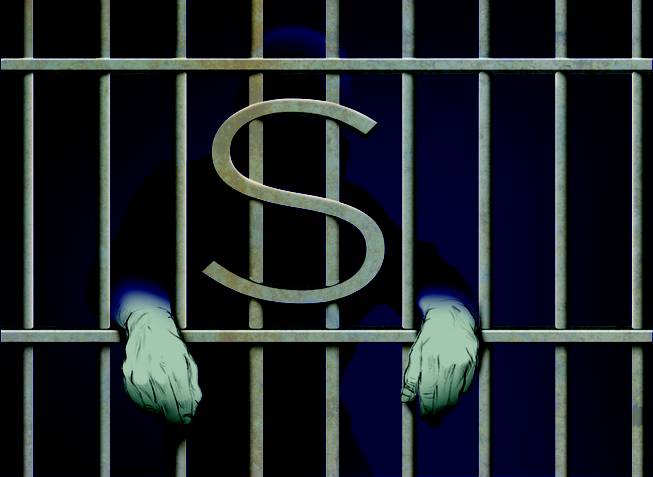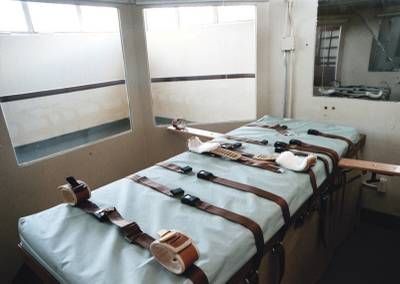Wednesday, Aug. 28, 2013 | 2 a.m.
Several alleged killers’ lives could be spared next month if Las Vegas judges rule in favor of defense requests to drop the prosecution’s bid for the death penalty.
The unusual motions filed by defense attorney Anthony Sgro come in light of the Nevada Legislature's approval this year of Assembly Bill 444, which calls for an audit of the state death penalty.
The audit, which is due by Jan. 31, 2015, is considered by some in the legal community a tall task: It’s a calculation of costs for all legal counsel — both defense and prosecution — for the capital pretrial, trial and postconviction proceedings. On top of that, it must include associated costs such as investigators, mitigation specialists, experts and actual cost of incarceration.
The motions are an effort to turn what is generally a philosophical conversation into a fiscal one.
“It seems to me, at some point, whether it is a district attorney or judge or, in this case, defense attorneys, somebody has to at least shine a flashlight on the problem,” Sgro said.
And so with the audit looming on the horizon and its consequences unknown, Sgro filed motions to strike the state’s intent to seek the death penalty in four murder cases: Bryan Clay, Prentice Marshall, Maurice Sims and David James Burns.
If judges aren’t keen on going that far, the motion asks, as an alternative, for capital proceedings to be delayed in those cases until the audit has been completed.
“The amount of money and resources that are going to be used by Nevada are 10 times what they are with any other case and maybe even more,” Sgro said. “Why not cut it off now to see what is going to happen?”
But that decision is up to a higher power. Clark County District Court judges will decide in September if the motions have merit.
A judge is scheduled to hear the motion in Burns’ case Sept. 5. The other cases have hearings on this matter slated later in the month.
•••
There’s a joke in the legal community that there are four approaches to the death penalty: There are states that don’t have it, those that have it but don't really act on it, those that use it all the time and Texas — which carried out its 500th execution in June.
Nevada lies somewhere in the middle, typically only conducting an execution if an inmate waives all of his or her appeals.
Twelve people have been executed in Nevada since the U.S. Supreme Court reinstated the death penalty in 1976. Of those, only one person was executed against his will.
There are 83 inmates on death row as of Monday afternoon, according to the Nevada Department of Corrections.
Clark County District Attorney Steve Wolfson, who was appointed by the Clark County Commission in January 2012, called the timing “appropriate” for an audit of the state’s death-penalty system.
“I would hope the auditors do a complete review of the status of the costs, as well as other issues involving a case where a death penalty is filed,” he said. “They are more costly than a nondeath case, but cost is just one factor that should be explored.”
A UNLV study published in 2012 found that, in Clark County, defending the death penalty costs at least $170,000 more than defending cases where life in prison is sought.
Wolfson has been mindful of the cost of capital cases since taking office.
In 2012, Wolfson filed capital charges in five cases. That same year, there were 114 homicides, the majority of which were criminal, in Clark County, Wolfson said.
So far this year, Wolfson has sought the death penalty in eight cases. As of mid-August, the Clark County Coroner’s Office had recorded 72 homicides.
“I believe only the worst of the worst should have the death penalty filed against them,” Wolfson said. “There are a lot of bad people who commit bad murders who will be convicted and spend the rest of their lives in prison — or a majority of the rest of their lives in prison — even though the death penalty was not filed.”
His predecessor, David Roger, wasn’t known for being as picky.
Roger butted heads with the Clark County Commission over what some considered his trigger-happy approach to the death penalty.
In 2011, the county had 80 pending death cases while Los Angeles County, which is five times Clark County’s size, had 33.
Roger, now an attorney for the Metro Police union, filed 23 capital cases in 2009; 23 in 2010, and 20 in 2011. The number of Clark County homicides during those years was 147, 151 and 113, respectively.
During a 2011 Clark County Commission meeting, Roger said he didn’t know the average cost of a death-penalty case and accused the commissioner who asked him that question as being “anti-death penalty.”
This is the kind of debate Sgro is hoping the audit will curtail. Sgro said he thought the conversation has hinged too much on peoples' beliefs without fact-based reasoning behind it, such as finances.
Clark County Public Defender Phil Kohn, who previously was a police officer and a prosecutor, said he has wrestled with the pros and cons of the death penalty his entire career.
One of his conclusions:
“There is no way to ensure any kind of uniformity or fairness,” he said. “You’re always going to have a jurisdiction-by-jurisdiction, prosecutor-by-prosecutor discrepancy.”
Like Sgro, Kohn hopes the audit marks the beginning of a statewide discussion about the death penalty.
“I think we have to ask, ‘Why do we believe in it?’” Kohn said. “What are we getting out of the death penalty that we can’t get without life without the possibility of parole?”
•••
How district attorneys decide to seek the death penalty varies in Nevada from county to county.
In Clark County, a committee of experienced prosecutors meets in secret to make the decision. The defense attorney of the accused is invited to attend a portion of the meeting and argue why his or her client shouldn’t face the death penalty.
Both Kohn and Wolfson have suggestions on how the process could be improved.
Statute mandates the district attorney decide whether to seek death within 30 days of the case landing in District Court. Wolfson said he thought the requirement put pressure on defense attorneys who typically haven’t had the case long enough to do extensive background investigation.
That can result in a time crunch to drum up evidence to persuade the committee not to seek the death penalty, Wolfson said.
The committee wants to see hard evidence — which usually takes time to gather — at these meetings because if the notice isn’t filed within those 30 days the prosecution is forever barred from seeking the death penalty, Wolfson said.
“I think there would be less death penalty cases filed if the defense was given more time to bring to the table more evidence of mitigation,” Wolfson said.
Kohn, however, isn’t so sure that’s the best solution to the problem.
While Wolfson may file fewer death cases with an extended time frame, Kohn said he worried another district attorney might simply use it as an opportunity to glean more information about the defense’s case.
Kohn doesn’t think changing the 30-day rule would matter since the prosecution can stop seeking the death penalty at any time if compelling mitigation evidence arises.
With so many tax dollars at stake, Kohn thinks the death penalty review committee should have a check on it — perhaps something similar to Metro Police’s Use of Force Review Board, which includes department and civilian representation.
Kohn suggests creating a second committee made up of former judges and prosecutors who could take a look at death-penalty filings and ask this question: “Is this really death-worthy?”
It’s the sort of change that Sgro argues could come from the public getting a frank look at what it’s paying for regarding capital punishment.
For now, the justice system is tasked with tallying the numbers to give Nevadans a clear look at the cost of sentencing someone to death.



Join the Discussion:
Check this out for a full explanation of our conversion to the LiveFyre commenting system and instructions on how to sign up for an account.
Full comments policy